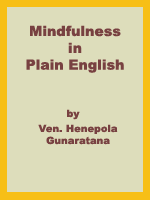Meditation in plain English

DOWNLOAD BOOK:
Mindfulness in Plain English by Ven. Henepola Gunaratana
www.sunnataram.org (PDF, 637KB)
ONLINE VERSION:
www.urbandharma.org
PRINT VERSION:
Book link to Amazon


The purpose of Vipassana meditation is nothing less than the radical and permanent transformation of your entire sensory and cognitive experience. It is meant to revolutionize the whole of your life experience. Those periods of seated practice are times set aside for instilling new mental habits. You learn new ways to receive and understand sensation. You develop new methods of dealing with conscious thought, and new modes of attending to the incessant rush of your own emotions.
This is completely a how-to book that tries to get you going in a practical way with Vipassana or insight meditation.
What Ven Gunaratana says about what meditation 'is not' is perhaps, in this context, quite important. The different meditation traditions are discussed and then Vipassana placed in context.
"It is a process of self discovery, a participatory investigation in which you observe your own experiences while participating in them, and as they occur. The practice must be approached with this attitude. " A whole chaper has been devoted to the right attitude to meditation.
The details of exactly what is to be done in the meditation process is explained, including the posture, what to do with your mind and so on. Dealing with distractions is, of course, dealt with in detail.
Because of its constant focus on how to do things, it could be an invaluable reference to the beginner, especially when she is assailed by the kind of innumerable doubts that accompany the practice of something as subjective as meditation. Things such as mindfulness can be very tricky.
Ven. Gunaratana's explanations are exact. "When you first become aware of something, there is a fleeting instant of pure awareness just before you conceptualize the thing, before you identify it. That is a stage of Mindfulness." He goes on to explain what is is, or perhaps come as close to it as possible. The difference between mindfulness and conentration is also explained.
What is in it for you, he asks, towards the end, which is just one of the many questions that underline his earthy approach to the topic of Vipassana meditation. "Once your mind is free from thought, it becomes clearly wakeful and at rest in an utterly simple awareness. This awareness cannot be described adequately. Words are not enough. It can only be experienced."
No comments:
Post a Comment